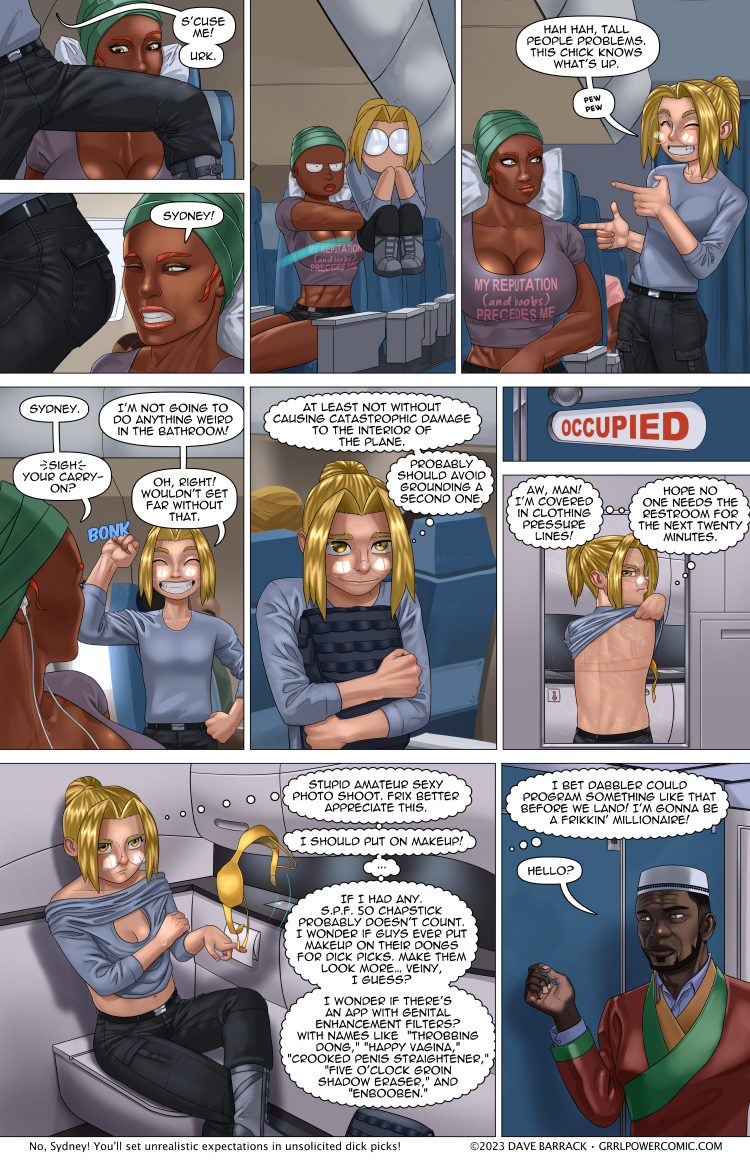Grrl Power #1144 – Just shoot me, me
The “clothing pressure lines” (I don’t know if there’s a more succinct term for that) can actually be part of the fun because they make the pictures look a lot more spontaneous, and a lot less like you were hanging out in a terry cloth robe while some lady touches up your makeup and the lighting guy tweaks the position of a few lamps.
Of course, Sydney’s not exactly an expert at nude selfies. She only sent Frix some because he assured her that “all the computers on Earth couldn’t hack his phone.”
I had to look up “Occupied” in French, but there’s a masculine and feminine form. I’m not sure how someone occupies a thing in a masculine way, probably it involves a lot of splaying, but for a unisex airplane bathroom, I guessed they probably use the masculine form, because of, you know, the history of the entire human race. But I asked on Twitter, and someone in the know said it’s not about the occupier, it’s about the gender of the bathroom. Not the intended gender of the people using the bathroom, the gender of the word “bathroom.” The gendered aspect of romance languages always seemed silly to me, like, learning languages is already tough, (especially when you do it later in life with no real chance for immersion.) So why tack on this addition, which in a lot of cases is utterly arbitrary, that makes learning that much more difficult? Whoever invented Esperanto and thought it would be a good universal language, but then also made it a romance language was simply not approaching the problem from a practical standpoint IMO.
When the world consisted mostly of spears and swords and bassinets and castles and fresh baked bread and hats, the gendered thing maybe made more sense, but in the age of wi-fi and video game texture tessellation, assigning gender involves flipping a lot of coins. What gender is wi-fi? What gender is the stratosphere, or the ozone layer? Is all air the same gender? I know there are answers to these questions, my point is, as the world becomes increasingly complex and our scientific understanding grows, the question of gendered nouns feels real arbitrary in a lot of cases.
Of course, complaining that something in a language doesn’t make sense is silly, because nearly all languages are a mess, as they evolved naturally over 5,000 years, and that’s before there was a new meme or fleek yeeting every week. Generally, the people inventing new words aren’t structure obsessed linguists. The guy who invented the term “Donkey Show?” Probably not a scholar.
Of course, after all that, someone then told me that airlines pretty much use English for everything because that’s just the standard and there are certain industries where you don’t want someone fucking up because of confusing labeling, even though I’m hopeful that someone giving a locked airplane bathroom door a jiggle isn’t going to knock it from the sky.
The March Vote Incentive is up! The thumbnail is weird because the picture doesn’t have anyone’s face in it. It’s an odd incentive, admittedly. Trying something new. But hopefully you all still enjoy it.
Variant outfits and lack thereof over at Patreon, as well as the semi-usual bonus incentive related comic.
.
Double res version will be posted over at Patreon. Feel free to contribute as much as you like.

















Airplanes are generally pressurized to about 8000 feet altitude equivalent, so you do have some full body swelling on a long flight.
Clothing pressure lines are a thing.
It’s not just romance languages that are gendered, it’s almost all European languages, including Latin and ancient Greek; English is exceptional. (Very many non-European languages are gendered also.)
I remember when I pointed out the ARC-Swat Latin motto was grammatically wrong because the gender of the adjectives didn’t match the nouns. You said you didn’t realize that Latin was gendered.
You do realize that all Romance Languages are based on Latin? Right?
Certainly. The Romance languages are also called the Latin or Neo-Latin languages. But Latin itself is not called a Romance language for some reason, I don’t know why. What is your point?
Yes, certainly. What’s your point?
Latin itself is not called a Romance language; I don’t know why.
Probably because it was the official “Catholic church language” and going to church wasn’t all that romantic?
(Ba dum Tish!)
The part people miss is that it’s not romance like LOVE. It’s Roman-ce; descended from the ROMAN. That’s also why Latin isn’t a Romance language, because Erik isn’t an Erikson, but all his descendants are.
Latin is not a Romance language because it’s the language that gave BIRTH to the Romance languages. Latin predates Rome. Vulgar Latin is what was spoken in Rome (Late Latin).
Btw just because it seems like some people might not realize it, when people say ‘Romance’ language it’s not because it’s ‘romantic’ – ie, love. In the context of languages, Romance is derived from the latin adverb ‘romanice’ which is used in the latin expression ‘romanice loqui’ – ‘to speak in Roman.’ In short, to reiterate, Romance languages are derived from the Late Latin languages, sometimes known as ‘Vulgar Latin’ which was largely spoken within the Roman Empire. The languages that are today known as Romance languages are because Latin, as the main language of Rome, spread to many different parts of Europe during the Roman Empire’s expansion.
Contrasted with Germanic languages, which evolved from Proto-Germanic, which are different in terms of grammar and intonation. English was a Germanic language, although Modern English has evolved to be a mishmash of mostly Germanic with about 1/3rd Latin and Vulgar Latin, most likely due to conquering via war and trade routes.
Not just war and trade, but some stupid nobles in the 18th and 19th century intentionally imported a bunch of Latin- and Greek-based words into English to make it sound more sophisticated to the rest of Europe. Which causes huge headaches everywhere because those words follow different spelling and pronunciation norms than the Germanic words that make up the core of the language.
Actually, Romance languages come from the “vulgar” version of Latin (the one spoke by the population), thus they got called Romance languages from “romanice loqui” (vulgar) as opposed to “latine loqui” the one spoken by the high class.
Japanese and Chinese are also very gendered.
Clothing pressure lines are Hem Mark’s. At least as I know them. It’s usually where the hem of too tight clothes press against you. They can be avoided. A lot of girls will wear tighter clothing cause it makes them look sexier but a looser outfit with better fit helps. Pluslotsof water.
Japanese and Chinese are technically genderless languages, because they do not require any agreement between nouns and associated adjectives, verbs etc. based on grammatical gender. This does not, however, mean that they do not use distinct forms when referring to people of different gender (actor, actress, niece, nephew, etc). The only remnant of gender in English is pronouns.
Mister Wolfe’s comment is sloppy.
The word ‘gender’ gets abused out of all recognition (not just by this poster) because it has multiple meanings, tempers can be high, polysemy, and misinformation. In terms of the original meaning of gender, a grammatical term only, the-Japanese-language is not at all gendered. In terms of ‘culturally speaking will speakers mark out the presented sexual characteristics and societal role of someone when they speak’ the-Japanese-language is very gendered.
Thanks for the additional context. Much less confusing.
Japanese and Chinese are not gendered languages, in that words do not have masculine and feminine construction (la vs le, el vs ella, etc). Even the Japanese -san vs -sama honorifics can be used for either gender.
Japanese and Chinese do, however, have different words for people of different genders, since Japonic and Sinitic languages tend to have a LOT more words than Romance and Germanic languages (Japanese ha 3 different alphabets, for example – hiragana, katakana, and kanji, whereas technically the Chinese language doe not have an alphabet (there are actually 26 ‘letters’ but Chinese is logographic so the letters do not represent sounds and therefore is not an ‘alphabet’ – chinese symbols represent meanings instead of sounds). For example, the chinese words ‘shi’ and ‘xi’ sound the same, but are spelled massively differently, and mean very different things – shi basically means ‘am/is/are’ or ‘to be’ while xi means ‘to love’ or ‘to be happy’ or ‘glad/joyful/etc.’
The cultures, on the other hand, are set up in VERY gendered ways for societal roles and how you should speak to someone depending on their gender.
And now I just read Ike’s post and BullCityFats post and … yeah… what they said. Without the whole linguistics lesson I forced you all to slog through. :)
I personally don’t think Shi and Xi sound the same, Xi I think sounds lighter in tone at the start of the sound.
Of course with Chinese things get really confusing: “Shī shì shí shī shǐ.” The lion eating poet in the stone den. It is very hard even for a native speaker to go through that without screwing up the tones. Adding in the tone would be really helpful here Pander :P.
To add in my experience of Chinese is that it’s not gendered any more so than English is.
I would have added the tone if I knew how in the chat :)
I don’t know much about Japanese (can read some), but I do know a fair bit about Chinese (mostly Mandarin).
“26 letters”? What’s that about? Chinese does not have letters. Are you talking about their use of the Latin alphabet for spelling out sounds (“pinyin”)?
The parts that make up Chinese characters (called “radicals”) vary somewhat from one dictionary to the next (esp. simplified vs traditional character sets), but is around 200 in the dictionaries that I’ve seen.
A quick web search makes me think English probably has more words than Chinese. But it might be a tricky question, because English makes different forms of words for plurals, verb endings and so on; while Chinese does not. So the word counts I saw might have artificially inflated the English numbers. Do you include words no longer in use? Chinese has a long history, which could inflate its word count….
Shi and xi do not sound the same in mandarin, even if you ignore the tones. The sounds are about as different as “shin” and “sign” in English.
The “x” is similar(ish) to “sh”, but the friction is at the back of the mouth, like if you pronounce a “y” and then close it off a little more. (Same relationship between j zh, and q ch, FWIW.)
And the sound of the “i” depends on the preceding consonant. It is like the “i” in “machine” after most consonants (including “x”). But after some of them (z, c, s, zh, ch, sh, r) it is sort of like the “i” in “ship”, but is almost not really a vowel so much as a trailing off of the consonant sound. That comes out almost like a “z” sound after the first three in that list, and almost like an “r” sound after the last four. Some older romanization system actually spelled “shi” as “shr” instead (which was better, IMHO).
Also, if we are just talking about sounds, there are about 70 characters in my big dictionary for “shi” (divided between the four tones). For “xi” there are about 90. One very frequently used character “shi” means “to be”, but another means “ten”, and another means “time”. For “xi”, you’ve got characters for “happy”, “west”, and “wash”. Some of these you could tell apart by the tones, but even if you pay attention to the tones there are still a huge number of homophones. (In speech, a lot of the ambiguity goes away because of two-syllable words etc. So it’s not actually any more of a problem than in English.)
But the point is, saying ‘”shi” means “to be”‘ is an extreme/misleading oversimplification. One character that is pronounced “shi” means that. Around 70 others mean other things.
Fun fact: a lot of Chinese characters are made of two parts, one of which gives a hint about the meaning and the other gives a hint about the sound. Unfortunately, those were made up a long time ago, and pronunciations have drifted over time, so some of those hints are misleading now.
再見!
““26 letters”? What’s that about? Chinese does not have letters. Are you talking about their use of the Latin alphabet for spelling out sounds (“pinyin”)?”
Yes thats what I am talking about. I did mention elsewhere in the post that Chinese does not have an alphabet like the latin alphabet since the symbols are not based on sounds like the latin and proto-indo-european based alphabets are.
“But the point is, saying ‘”shi” means “to be”‘ is an extreme/misleading oversimplification.“
Yes but I did not want my post to be 3 pages long so I gave the extreme simplified translation. I am verbose enough naturally. :). Smae elaborated on my post a bit.
Ha, verbosity. Yep, I’ve got a bit of that myself. I’m sure you didn’t notice. :-)
Yes, you said “Chinese does not have an alphabet”, but you also said “the letters do not represent sounds and therefore is not an ‘alphabet’”; pretty sure you were talking about parts of characters and calling them letters. That’s not completely unreasonable, except that “letters” meant the other thing thirty milliseconds earlier, not enough time in between for me to change gears.
But I guess the thing that really set me off was saying that “xi” and “shi” sound the same. Beginning students hit that all the time, and it makes me a little crazy. ….er.
“xi” rhymes with the English word “she” because the ending is the same, but pinyin “x” is not quite the same as “sh”.
And “shi” rhymes with…. Nothing really. You could get away with saying “ship” without the “p”, and probably be understood. But as noted in my exceptionally terse notes above, it isn’t quite right – they’d know right away you were not a native speaker.
Okay, I’m gonna climb down from the chandelier and take a chill pill now.
“pretty sure you were talking about parts of characters and calling them letters.”
I probably should have used some other word. :)
“That’s not completely unreasonable, except that “letters” meant the other thing thirty milliseconds earlier, not enough time in between for me to change gears.”
Well it’s just Chinese doesnt use sound-based…. ummm characters might be a better word? Symbols maybe? Chinese is lgographic and the letters/symbols/characters represent meanings rather than sounds, so there is no actual ‘alphabet’ – that’s all I was really trying to say without making my post longer than they already tend to be. :)
“But I guess the thing that really set me off was saying that “xi” and “shi” sound the same.”
It would be easier to describe if I was able to actually say it but I’m limited by having to write. My bad.
Whenever I think of Latin I get a warm fuzzy feeling knowing ancient Rome is dead and cant do that to the world again. Amo, amas, amat, amamus, amatis, amant my ass. Bunch of linguistic wankers.
But I’m not bitter… :P
@ varia vespasa
English has the tyranny of our rather peculiar spellings. Our word-order which we use instead of declining verbs and /or adjectives to fit is ‘unspoken’, it isn’t taught either. Maybe having a language with peculiar coding is necessary to dominate the world?
Brutus adsum iam forte
Caesar adoration
Brutus sic in omnibus
Caesar sic in at
Haha! Must remember that one.
You don’t actually have to know any Latin to understand it. Unlike “The Motorbus.”
https://allpoetry.com/The-Motor-Bus
Well, did you know romance languages are latin based, like is german ,english and …well..essentially everywhere else where romans went … where as look example onto eastern europe languages to find non-gendered languages
English and German (and a few other languages that I’ll mention below) are not Latin-based, although English’s most recent evolution of the language has taken some elements of Latin via French.
Here’s the basic timeline:
There was first a Proto-Indo-European language which then split into Indo-Iranian, Hellenic, Celtic, Italic, Balto-Slavic, and Germanic. Italic evolved into Latin (including Late Latin/Vulgar Latin), which then evolved into the Romance Languages – primarily French, Romanian, Spanish, Catalan, Portuguese and Italian. Meanwhile, Germanic evolved into North Germanic and West Germanic. North Germanic created Old Norse and Swedish, and Old Norse evolved into modern Norwiegan and Icelandic. Meanwhile in the next county over, West Germanic split into Anglo-Frisian, Old Dutch, and Old High German. Old High German evolved into Middle High German, which then evolved into Modern German and Yiddish, although Yiddish is a bit of a dying language right now. Old Dutch evolved into Middle Dutch, which split into Flemish, Modern Dutch, and Afrikaans. Anglo-Frisian split into Old English (like what you’d read in Beowulf or the Niebelungenlied), and Old Frisian. Old Frisian became Frisian (which is spoken in a region around the Netherlands and Germany).
Old English and French teamed up at that point, which is how Latin burrowed its way partially into the English language, and that’s where Middle English came from, which eventually evolved into Modern English.
So no, German is not Latin-based at all, and while English did get some Latin from French, it’s not ‘Latin-based’ either – it’s Germanic-based. It just has had a bunch of latin added on afterwards.
One of the very weird things about that is that the Germanic languages that form the core of English, as well as the whole mess of Latin- and Greek-root words, are gendered, but English itself is not.
How this came to be I do not know, but am very thankful for that idiotic mess not making our idiotic mess of a language even worse.
“How this came to be I do not know, but am very thankful for that idiotic mess not making our idiotic mess of a language even worse.”
I wrote a little timeline above of how ‘this came to be.’ :)
You gave a description of how English came to be, but not how English somehow ended up not assigning genders to inanimate objects when its parent languages do.
English was a gendered language until around 1200. While nobody knows exactly why that changed, the best guess I’ve heard is that during that time england was being invaded by the Norse.
The languages spoken by those two groups didn’t agree on many genders and so the bilingual people in the area just stopped using them altogether. From there it spread to the rest of the island over the next 100 years
Yes i did when i explained how french modified middle english to have more latin influence as oppsed to old english.
The word “gendered” isn’t even in your post. And since Latin-based languages are gendered, nothing can be inferred about it either.
Yes it can. Here’s where it’s inferred:
“Old English and French teamed up at that point, which is how Latin burrowed its way partially into the English language, and that’s where Middle English came from, which eventually evolved into Modern English.”
French is a latin-based language – one of the Romance languages.
Which, again, doesn’t say anything about why, despite both the root Germanic languages and French using gendered nouns, English doesn’t.
Ah I think I misunderstood what you were asking.
Germanic languages also used (and German still uses) a neuter term, das. As opposed to die and der. English kept THAT from German, along with many other things. But English WAS a gendered language until around the 1200s – instead of using the or a (the neuter term, like the Germanic ‘das’), English also had se (masculine) and seo (feminine). When English started incorporating French between old English and middle English, instead of using the Germanic OR French masculine and feminine, it just kept their version of the Germanic neuter, and dropped the gendered language for nouns that do not have ‘animacy.’ German ‘das’ = English ‘the’ (definite article) or ‘a’ (indefinite article) and se and seo fell out of use (additional but probably unrelated tidbit – this happened around the same time ‘you’ became more prominently used instead of thou and thee).
I can even tell you the most likely reason WHY se and seo was dropped. Like with Old Norse, sometimes the genders contradicted each other and gendered nouns were most likely dropped in order to simplify communication. Other language took a similar approach like Hungarian, Estonian, Finnish, and several more languages derived from Old Norse. Largely because it was easier to spread the language that way (less to remember – you didnt just have to remember that lapiz means pencil in Spanish – you have to remember that it’s EL lapiz).
As I’ve had impressed upon me by my Spanish teacher, it’s not the gender of the object, it’s the gender of the *word*.
…not that that makes things any better, but it does clarify some things. I think a lot of grammatical gender just ends up being phonotactics — the different genders have different suffixes (and in Spanish at least, different articles) and some just sound better with the word’s root.
I actually haven’t had much trouble learning Spanish, since I learn the article with the word. I don’t learn “perro”, I learn “el perro”, all as one thing. The only really confusing things so far are that 1) a few roots can have multiple grammatical genders with different meanings (el orden, la orden), and 2) some words actually take *personal* gender, like la profesora/el profesor, rather than grammatical gender. (They take the gender of the person, aka the actual “object”, rather than the word’s own gender.
Unless the word is a part of someone’s name, in Spanish I’m El Poeta Opus, but when talking about me and my former occupation it would be la poeta. I remember this from before the truck.
Don’t look so flushed Sydney, just roll with it.
Just how long was Syd in there to have someone knock on the door?
Exactly the question we’re supposed to ask: Sydney fell down an ADHD rabbit hole, all about nude selfies, so long people got concerned.
Asking “Did you fall in?” to Sydney when she’s in the bathroom is actually totally appropriate and could possibly be answered in the affirmative. I’m sure it’s happened at least once.
She could have literally turned the dial to have someone who needs it ‘more urgently’ than she does
That’s a passenger, not crew
I realize you almost definitely won’t read this, Dave, but in response to your commentary… linguistic gender and sexual gender are not really related. It’s not about whether a castle or hat or the ozone layer has feminine vs masculine attributes in the human gender sense, or is traditoinally considered the domain of women vs men – it’s more to do with the last few letters of the word (in French, for instance, your example of “tessellation” would almost definitely be feminine because most words ending in “tion” are feminine) or other attributes of the word in other languages. German actually has three, usually called masculine/feminine/neutral, and words that you’d think would be linked to what we English speakers think of as gendered don’t match what you’d expect. For instance, the German word meaning “girl (child)” is a neutral word, not a feminine one (das madchen). It’s a little like we use “a” or “an” in English depending on whether the word that follows begins with a consonant or a vowel. So the gender of “wi-fi” in a given language would probably be decided based on it beginning in “W” or ending in “I” or perhaps on whatever convention that language has for words that are obviously borrowed from other languages, not based on whether the speakers come to a consensus on whether wi-fi seems more manly or womanly.
I guess my point was that when you have to come up with a new word (I’m assuming French from 600 years ago didn’t have a word for O-zone or tessellation or integrated circuit) there’s still a decision that needs to be made at that time whether the word (and concept behind it) is male or female. There’s intentionality there, I’m sure the word for “sword” is masculine, and not by accident. For a lot of thing, I’m sure it doesn’t matter, but for other things it’s probably fairly important.
Circuit doesn’t change gender when it became integrated. Lot of new words are based on old words and get the gender from the old words. All spheres and all layers have same gender, and are quite old words, so it doesn’t matter that stratosphere is relatively new and blogosphere even newer.
At least in my language, but it sounds like something which should work in most languages.
circuit is gendered male-wise,, the feminine is biscuit
:P
We’re there protests in the 1950’s when the circuits became integrated?
Only when they started to burn their brass publically
The word for “sword” is feminine actually. Going through your list:
spear = une lance, féminin
sword = une épée, féminin
bassinet = un berceau, masculin
castle = un château, masculin
fresh baked bread = un pain fraîchement cuit, masculin
hat = un chapeau, masculin
You’d be surprised how little it has to do with gender stereotypes.
So, would the feminine of ‘un chapeau’ be ‘une chapeuse’?
une bonnette
*giggles*
And in german, we have this 3rd gender – object – “das” (it) for some objects that do not have a male or female gender.
Then again, we use this weird – the knife is an “it”, the fork is female, while the spoon is male.
This is pretty much a lithmus test for non-natives, as only people growing up with it will get these things right, and even ther arecontroversies and regional differences – for example, there is a common quarrel about wether the plate is male or an object :D
Wow, you did read it! Thanks for taking the time to reply! (Looks like the subject of grammatical gender has been discussed to death, so I’ll leave it be, but just wanted to say thanks for the answer!) :)
Dabbler got to have the world’s nicest butt in her face.
That’s not Dabbler, that’s Anvil :P
I don’t think that’s Dabbler. Anvil had the aisle seat. Dabbler was by the window and Sydney was between them. Dabbler isn’t even listed in the who’s who section.
Three seats in a row, but only one single bathroom for all genders?
What kind of airline is that supposed to be?
Every airline is what they are. Unless they have chartered a flight they are probably on a largish airliner. A 747 may have four toilets but many airliners just have two. I don’t think airlines/aircraft designers care much about gender politics. The toilet is assigned to whatever gender is sitting on the throne at the moment.
French is gendered, but in this case, it is the toilets that are occupied. No matter who is inside.
You could have used “occupé” in a weird kind of neutral ” c’est occupé” which is the most frequent use or “occupées” because the toilets themselves are. And “les toilettes” is a feminine plural.
The “occupée” sign is appropriate for an individual toilet.
Also most of the time we use WC instead of toilettes, and WC is masculine, that would explain why most of the time “occupé” or “occupés” is used instead of “occupées”. Because yes to add confusion WC could be either plural or singular.
And oh the irony WC is anyway the abbreviation of an English word
Try Swedish, it is not gendered -but it used to be.
So every word is neutral, but the suffixes and definite articles are dependent on the old genders. But since gendering is not used any more you simply have to learn which word uses what set of rules, by heart.
Sounds like the worst of all worlds.
wouldn’t they just use the international stick figure symbols for male and female?
airplanes don’t have a room with many stalls. all air plane restrooms are single occupant; there’s no men’s room and women’s room. some have a single seat whose cushion flips up where you have to make eye contact with other passengers while you shit because the “privacy screen” is only shoulder height
i remembered that after i posted airplanes just have a few enclosed one seat unisex facilities
with a slide lock that moves the sign on the out side between occupied and vacant
Speaking of “the Donkey Show”, in German that would be “die Eselshow”, which of course would confuse native English speakers thanks to it being feminine, despite this form of donkey being a masculine word in German. Female donkey would be “die Eselin”. But in that case, the word takes its genus from “die Show”, not from “der Esel”, and thus you have a female show with a male donkey in the starring role. It can be utterly confusing, even without throwing in the third genus of the Neutrum or the changes coming from plurals (“das Kind” -> “die Kinder”; “the child” -> “the children”).
In all honesty, mostly this confusion comes to because English, as a language, cheats like a motherfunker. And then steals from other languages like a kleptomaniac. Which is where a lot of the irregular verbs get their quirks from. As for how to learn it… simplest way is stupefying repetition and learning of the word with its article, and plurals, and tenses, an so on. Once you get through the first curtain of “WTF is all this”, most romantic languages tend to have internal coherence and structure that then makes learning new words easier.
If you want a nice bit of German brain teaser, have a little contradiction story:
“Dunkel war’s, der Mond schien helle, als ein Auto blitzeschnelle, langsam um die runde Ecke fuhr.
Drinnen saßen stehend Leute, schweigend ins Gespräch vertieft, als ein totgeschossener Hase auf der Sandbank Schlittschuh lief.
Und ein blondgelockter Jüngling, mit kohlrabenschwarzem Haar, saß auf einer grünen Kiste, die rot angestrichen war.”
I have the impression that almost all the irregular verbs in English go back to Anglo-Saxon and thus are Germanic.
Anglo-Frisian actually.
Blue Haired Lawyer: “Well what about that tattoo on your chest? Doesn’t it say ‘Die Bart Die?’”
Sideshow Bob: “No, for German. It’s ‘The Bart, the.’”
(Parole Board laughs and murmurs approvingly to each other)
Parole Board Lady: “No one who speaks German could be an evil man.”
Parole Board Man: “Parole granted!”
Sydney, how inconsiderate!
Let me look at your Hero card!
Hmmmm. “Good but not nice”. What’s that supposed to mean?
A lot of languages, not only romance ones, have genders, and they have linguistic sense. English has some silly things too, so you can stop feeling so superior and looking down other languages.
English lacking grammatical gender makes it easier to learn.
English stealing vocabulary from every respectable language in the world makes it a bit harder, cause English vocabulary is the size of three normal languages.
English often but not always reusing the conjugations and cases of words from other languages (which are usually wildly irregular in English) makes it a clown show, because that brings back all the context-dependent form variation (and more!) that other languages have with genders. You don’t have to know what gender something is to know what arbitrary set of past tense verbs to use with it is or its plural form or whatever, but if you have learned which set of variations it uses you can often as not figure out whether we stole it from Spanish or Japanese.
English looks down on other languages, solely because it has beaten them senseless in some alley and is bending over them, rifling their pockets for spare words.
A later comment, I just discovered, properly quoted James D. Nicoll’s remark about English, which I bowdlerized a few minutes ago.
I love how Sydney is drawn in panel 3 and the second last panel. Chibi Sydney is cute too – reminds me of the fancy style at the start of the comic.
A key thing to remember is that language gender and person gender are homonyms, they’re not actually the same concept. I wish they had named language gender splorb instead of gender. That makes your bathroom’s splorb left, up, sparkly, or strange.
In many languages the language gender only makes a distinction between living and dead AKA gendered and ungendered.
That name for “language gender” would be odd, because it has been called “gender” for literally centuries. Person gender is more recent, dating to sometime in the twentieth century; I can remember the change from official forms having a line for “sex” to later forms having a line for “gender.” It seems originally to have been something of a euphemism, and then in the 1970s Robert Stoller wrote Sex and Gender, a two-volume study of transgender in human development, which led to the current usage of “gender” as subjective self-definition, or at least anticipated it. Anyway, the term “gender” was established in linguistics a long, long time ago. If a new word was going to be made up it would have made more sense to use it for the new concept.
French is a very gendered language. They have a pronoun now for ungendered people. It has two different spellings: the masculine form is iel and the feminine form is ielle. I don’t know what the rules are for when you use which form.
Cursed French Fact: Their word for “vagina” is masculine.
Like the ‘real medical terms’ in English, the terms are based on the Latin for a ‘sword’ and its ‘scabbard’.
Sword in Latin is ‘gladius.’ We call it sword because it comes from the Germanic and proto-germanic.
Modern English = sword
Old English = sweord
Proto-west Germanic = swerd
Proto-Germanic = swerda or swerdam
Proto-Indo-European = sehw (meaning ‘sharp’ since I don’t know if swords were a concept at that point, but that’s the most probable origin for the proto-germanic word)
“all the computers on Earth couldn’t hack his phone.” – still famous last words. His phone may be tamper-proof against everything on earth but what about her phone?
“original nude selfies of the Mighty Halo” are probably worth a fortune :D
As per https://www.grrlpowercomic.com/archives/comic/grrl-power-333-my-golden-angel-of-destruction-is-the-centerfold/
In regards to ‘clothing pressure lines’; I believe the term you are looking for is ‘pitting edema’.
Thought many early comments would notice that guy knocking having white skin on his palms. Adding to the fact he “conveniently” knocked as Sydney got alone… this does hint he’s not a random person who just needed the toilet.
Maybe you’re just commenting on degree, but many black people have paler skin along their poems. Not doing that is actually a fairly common artistic mistake.
And for what it’s worth, my interpretation is that she has been in there for a while, so this is not so sudden.
Agree with you, Sean.
Dark-skinned people very often have lighter-colored palms, the human palm just produces way (5x) less melanin regardless of skin tone.
While it is possible this is not just a stranger who needs to use the toilet, the colour of his palms is not a hint at such at all. It is not unusual for a person’s palms (and also bottoms of feet) to be paler than the rest of their skin.
It’s just not as noticeable on pale-skin people (if you look closely on some, you can just make out the dividing line)
The flight attendant can easily pop open the door (you flip up the “Bathroom” sign on Boeing jets) so if this guy is a flight attendant naked Sydney might get a surprise…
He’s not a flight attendant
He appears to be wearing a uniform of some kind… it seems to be very brightly colored to be normal clothing.
Shathak (Mrs. Tsath) grew up in a Swahili speaking country. When she returned to the US she found it weird that language was so gendered. Every time you talked about a person you were, in essence, referring to their naughty bits or lack of them in the case of “it”.
Ladies, attention, please: Clothing pressure lines are sexy, they show that you *just* undressed to take a naughty pic for us.
And they add visual interest and contour. See also “tan lines”, “tattoos”.
“Women, Fire, and Dangerous Things”
Linguistic gender often really isn’t about gender, but categorization.
Romance languages aren’t the only ones where objects are gendered. German has three genders: masc, fem, & neuter. And you’d think that things would be gendered by “woman’s traditional world” vs “men’s traditional world” but mostly it doesn’t make much sense. For example, it’s “le bikini” (masc) even though it’s a woman’s garment. The word for maiden in German is neuter. So’s a spinning wheel, for that matter. Newspapers and poetry are feminine.
It would be interesting (and likely incendiary) to debate the gender of certain English words, but WiFi should definitely be female.
WiFi is female in my language. And regarding stratosphere, or the ozone layer … those are actually easy: all spheres and all layers have same gender, and are quite old words, so it doesn’t matter that stratosphere is relatively new and blogosphere even newer.
Whoever invented Esperanto probably had the same very western-European “All Languages Are Derived From Latin” mindset that my (public) middle school used to justify requiring all 6th graders to take Latin if they didn’t require Remedial Reading, which was less grounded in believing that German and Russian and Arabic and Chinese are derived from Latin and more in “the only languages we offer that actually have state standardized tests are Spanish, French, and Italian, and you have to wait for 7th grade to start Spanish or French, or 9th to start Italian”. My parents *tried* to object on the basis of “the only modern user of Latin is the Roman Catholic Church, therefore requiring Latin is a form of Catholic indoctrination”, but were overruled.
In the back rooms where decisions are made, though… it may or may not have been a balancing act to make sure there were enough students in French and Latin across 6-12 to justify keeping certain teachers on full-time payroll as the demand for Spanish and/or Italian vastly exceeded that for French.
When I was in 12th grade they offered Russian and Japanese to 9th graders on a trial basis, ended up keeping Japanese and dropping Russian for the following year. Personally… I would’ve benefited from Russian or German or Hebrew (or Yiddish), but these trials were offered when they were because of evolving global economic and political situations, and not out of any religious-issue sensitivity. I suspect the joke ended up being on the school, though: the kids taking Japanese were more likely to use it to watch anime un-butchered than to become global business executives.
Actually, the guy who invented Esperanto (L. L. Zamenhof) was Polish. He grew up speaking Russian and Yiddish, and learnt Polish and Byelorussian as a child. None of these are derived from Latin, and only Yiddish is even Indo-European.
One of the great scenes from NCIS was McGee and Abby. McGee: that sounds like a made up word. Abby: All words are made up words.
Heheh, panel 9? Next to the last, is great both with the monologue and Sydney art.
I’ve never heard of “clothing pressure lines” as a term. I have, however, heard the terms, “seam marks” or “seam lines,” usually mentioned with the relevant clothing mentioned. So a “bra wire line” would refer to the lines left by bra wires. A “hat line” would refer to the line(s) from the brim of a too-tight hat. A “belt line” is from pants, but if you’re from Wisconsin, “beltline” is the ring road around the City of Madison, WI.
This only sounds confusing because I’m explaining everything at one time. A native resident of Wisconsin would learn things slowly, usually during childhood.
When adapting new terms into a gendered language it really doesn’t matter which gender is attributed to it, only that everyone sticks to it to avoid confusion. Having agreed upon genders for all nouns cuts down significantly on the amount of words necessary to clarify which other words in a sentence apply to which noun.
For example:
“Today I saw a superhero hitting a tank with a sword that was shining with golden light.”
In this sentence it could be either the superhero, or the tank, or the sword that was shining with golden light. In most gendered languages there is at least a 50 % chance that further clarification isn’t needed due to a version of “that” conforming to the gender of only oen of the nouns.
Nice try, but superhero, tank and sword are all male. Now, if he was hitting a ship …
In german, sword (“Das Schwert”) is grammatically neuter.
Apparently in french too.
I misspoke, in french it’s female.
Different gendered languages obviously don’t agree on which gender to assign to any given noun. I never claimed that further clarification is always unnecessary, but there’s a decent chance that it is.
No, that sentence is crystal clear. “that” is referring to the sword. In the absence of breaks, like commas, it refers to the most recent subject.
For it to refer to the superhero, it would be “Today I saw a superhero, hitting a tank with a sword, that was shining with golden light.”
For the tank, it would be “Today I saw a superhero hitting a tank, with a sword, that was shining with golden light.”
In either case, it’s bad form to say it in that order, because of the risk of confusion from the breaks not being understood correctly. It would be much more appropriate to immediately follow the subject that was shining with golden light with that descriptor, as in “Today I saw a superhero, shining with golden light, hitting a tank with a sword.” or “Today I saw a superhero hitting a tank, shining with golden light, with a sword.”
Native English speakers on the internet have collectively disregarded any sense of proper punctuation, so I won’t bother learning it now.
“In this sentence it could be either the superhero, or the tank, or the sword that was shining with golden light.”
This is incorrect. In the sentence as you wrote it, it’s the sword which would be shining with the golden light because it would normally, without having any further elaboration, refer to the most recent noun preceding the description, which would be the word ‘sword.’
And once again I wrote this before seeing someone else wrote something similar (in fact better than what I wrote – gimmethegepgun)
This is the most boring, confusing comments section in the whole comic..
speaking of terms in languages, stumbled on this a week or so ago and forgot about it. Don’t know if brought up years ago with the Eskimo sisters page when looking for a real world common term.
Found one by pure chance, Stomach Sisters, a term from Iceland referring to women who have slept with the same guy.
*also translated as Belly Sisters, or Belly Cousins/sisters.
“Now, a question of etiquette. As I pass, do I give you the ass or the crotch?”
I was at a standing-room only concert so crowded that people were jostling against each other. Between bands someone squeezed by me to my right, which I was about to ignore until I registered that it felt as if someone was sliding their breasts firmly past my elbow. I looked over and locked eyes with a short but well endowed young woman, who looked up at me with an expression and grin that clearly said, “you’re welcome!”, as she continued away slipping sideways through the crowd.
And yet she thinks herself inferior to others when she is sending This to Space.
You are way overthinking this, Sydney.
Now I’m hoping that Sydney’s airplane bathroom nudes are posted in the nsfw Patreon.
It’s always funny to me when some english native speaker complains about the peculiarities of other languages. Given that the average english speaker doesn’t know how to pronounce any new word that cross his path. And those other languages that they complain so much any 5 year old is able to do it without much problem.
Trying to compare other languages to ‘English’ is a little tricky, English IS other languages, 300+ of them.
There’s very little of the original English in the ‘English’ of today, less than 10% accoring to some sources, others say it ‘s much less and getting less with each new expression ‘borrowed’ from a visitor.
At one point it was deemed unfashionable or even illegal to speak English in England, French or latin being preferred by the higher levels, most of the Court at one time couldn’t even speak it.
There’s a book by Bill Bryson called “The Mother Tongue:English and how it got that way”, a fascinating read and I highly recommend it, written for the non-linguist and quite entertaining.
I seem to vaguely remember a TV series on the subject back in the 70’s but I can’t remember what it was called off the top of my head.
One saying in particular about ‘English’ has a great deal of relevance though…
“The problem with defending the purity of the English language is that English is about as pure as a cribhouse whore. We don’t just borrow words; on occasion, English has pursued other languages down alleyways to beat them unconscious and rifle their pockets for new vocabulary.”
― James D. Nicoll
As for the lavatory sign…it’s a generally accepted international convention/custom (there are always exceptions to anything) that red letters used in that way mean something is ‘not available’ and green letters mean it is.
This didn’t show up at first, if it’s a double post, kindly disregard whichever one you read last ;)
Trying to compare other languages to ‘English’ is a little tricky, English IS other languages, 300+ of them.
There’s very little of the original English in the ‘English’ of today, less than 10% accoring to some sources, others say it ‘s much less and getting less with each new expression ‘borrowed’ from a visitor.
At one point it was deemed unfashionable or even illegal to speak English in England, French or latin being preferred by the higher levels, most of the Court at one time couldn’t even speak it.
There’s a book by Bill Bryson called “The Mother Tongue:English and how it got that way”, a fascinating read and I highly recommend it, written for the non-linguist and quite entertaining.
I seem to vaguely remember a TV series on the subject back in the 70’s but I can’t remember what it was called off the top of my head.
One saying in particular about ‘English’ has a great deal of relevance though…
“The problem with defending the purity of the English language is that English is about as pure as a cribhouse whore. We don’t just borrow words; on occasion, English has pursued other languages down alleyways to beat them unconscious and rifle their pockets for new vocabulary.”
― James D. Nicoll
As for the lavatory sign…it’s a generally accepted international convention/custom (there are always exceptions to anything) that red letters used in that way mean something is ‘not available’ and green letters mean it is.